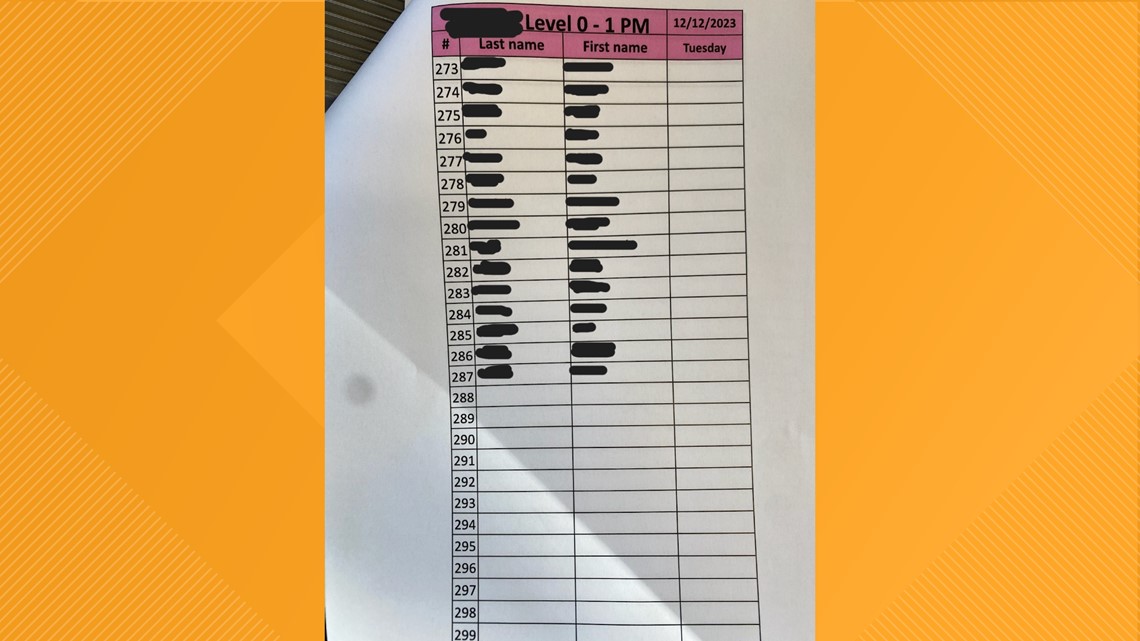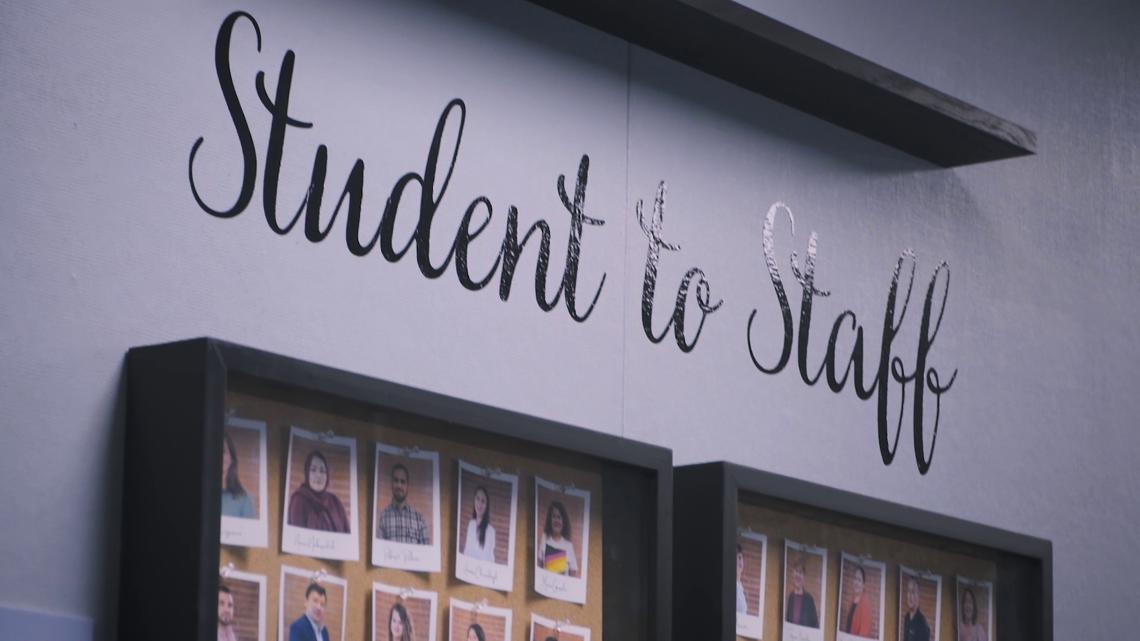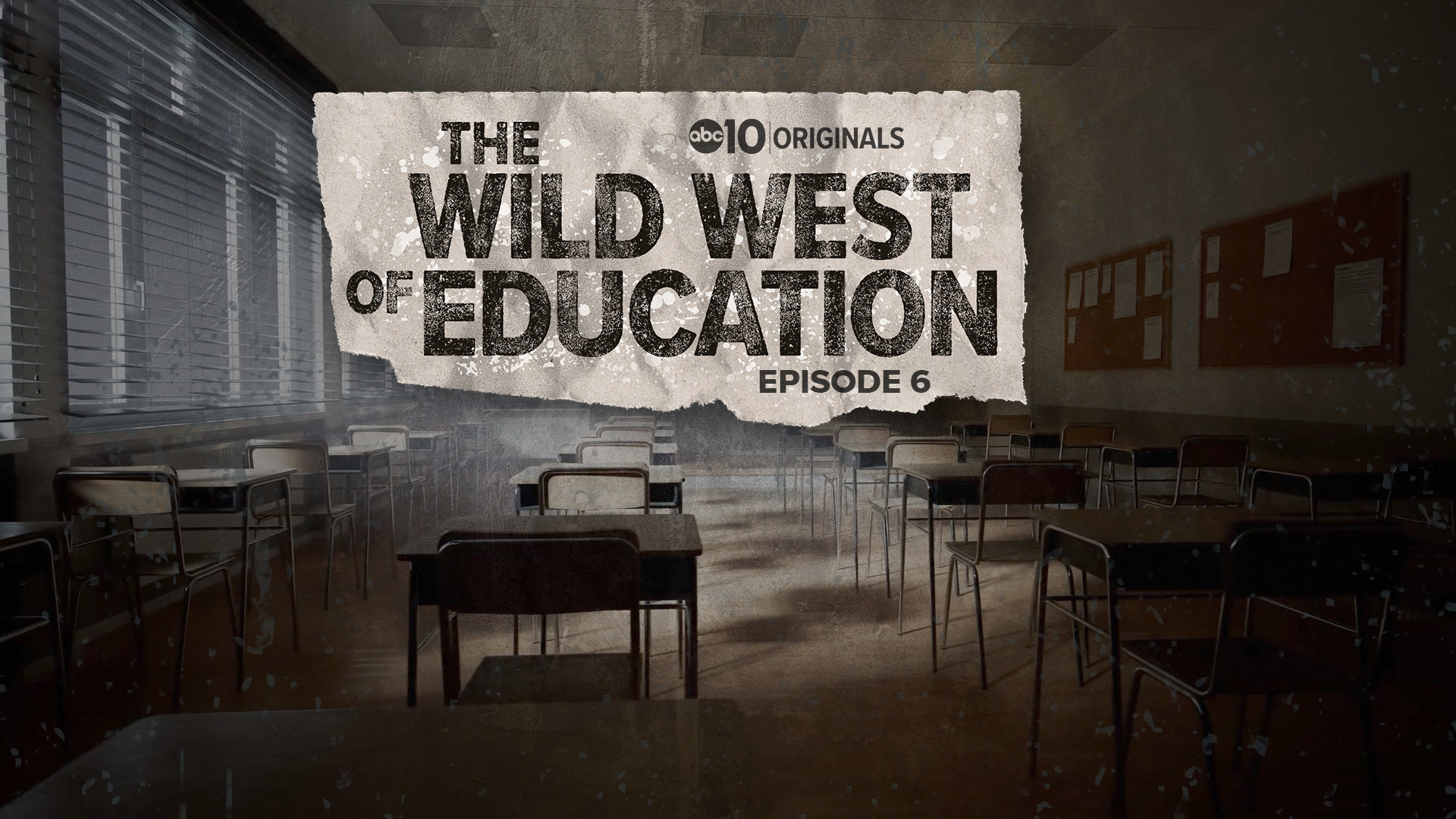SACRAMENTO, Calif. — “I immigrated to the United States… trying to find a better job,” said Sam. “A better life.”
It was a move for the American dream — a dream this person worked hard for and wants to protect — which is why ABC10 agreed to conceal their identity. For this story, we’re calling them “Sam.”
Sam couldn’t speak much English upon their arrival to the United States.
“I can say (what) my name is… but that’s pretty much it,” said Sam.
So, Sam enrolled at Highlands Community Charter and Technical Schools. Many refer to the school as simply, Highlands.
“I found out about Highlands from one of the students,” said Sam. “I said, ‘Oh I’m going to go try it.’”
Highlands is a charter school for adults where students can get a high school diploma, learn English and get certified in a trade like truck driving.
Most Highlands students are there to learn English, according to teachers, administrators and nearly 40 other sources ABC10 spoke with - as well as school documents show.
“I was determined. I said, ‘I need to learn. I need to learn as fast as possible,’” said Sam.
Other immigrants in the Sacramento area feel the same way. Highlands has thousands of students in-person and online. There’s a great need for this kind of education in our community.
But both former and current employees say Highlands’ leadership doesn’t care about the education students receive; they care about attendance.
Highlands gets money for every student in class.
In the last six school years, from 2018 to 2024, Highlands Community Charter and Technical Schools told ABC10 they’ve brought in $451,615,717 for attendance.
“We have those huge classes, like with 40 or 50 or 100 students enrolled,” said Sam. “And the teacher (is) alone.”
Sources say the push to increase attendance led to questionable practices, like oversized classes.
“I had a room that had 34 chairs. At one point I had 88 students in the room,” said former Highlands teacher Ali Diaz.
Videos provided to ABC10 show overflowing classrooms, forcing some students to sit on the ground.
And when Highlands couldn’t get that many students, sources tell us the school pressured teachers to inflate numbers – as we first reported earlier this year.
All to keep tax dollars coming in, sources say.
“That is where you would see an economy of scale in a charter school, or any school, in terms of money,” said Dr. Frank Adamson.
Education expert Dr. Adamson has researched charter schools for decades and confirmed large class sizes can be a sign of financial incentive.
At Highlands, a class with one teacher had 287 enrolled, according to a photo of a December 2023 roster provided to ABC10.


“That was a struggle for me throughout my time teaching there in-person and online – was just having ridiculous numbers of students on my rosters, like hundreds,” said Diaz.
Sources also showed ABC10 two other rosters from March 2024; one had 382 students, the other 347 students. Each class had one teacher.
“That’s my college psychology class, not a high school class,” said Adamson. “That’s not appropriate.”
He questions how Highlands rosters can have that many students enrolled without the physical room for them.
“These are the types of things where I get really concerned about both our students, the education and the public dollar,” said Adamson.
In a statement to ABC10, Highlands said “students may be enrolled but not attending. These (enrollment) numbers are reflected in teachers’ rosters. A teacher might have 100 students enrolled in their class on PowerSchool, but if only 40 students attend class each day, the ADA for that class will be 40.”
Highlands Community Charter and Technical Schools’ full statement is available at the end of this article.
“We have open enrollment, so there’s no cap on class sizes,” said Diaz.
Twin Rivers Unified School District (TRUSD) authorizes Highlands’ charter and is supposed to provide oversight. The district told ABC10 “maximum class size does not apply to Adult Education classes,” and class sizes at Highlands should only be reduced when there are more students than “classroom capacity or if the quality of instruction is impacted,” per their policy between the district and Twin Rivers United Educators (TRUE).
But Highlands staff say both capacity and quality are huge issues.
“They fill up the rooms with up to 40 students, 50 students – beginner students that are not able to really learn the language at all,” said former Highlands teacher Elke Dameson.
Highlands Executive Director Doc Smith discussed the schools’ large class sizes during our October 2023 on-camera interview.
“Our classrooms are bigger, but this is what every school in the country should be doing – get paraeducators. Some (teachers/classes) have three paraeducators,” said Smith. “I don’t know how many schools in the country assign a paraeducator to every teacher.”
Paraeducators are teacher aides. The job description provided to ABC10 says paraeducators “assist certificated teachers” under the direction of a supervisor.
“So, I really needed the job,” said Sam, who was a student and hired as a paraeducator right out of a Highlands class.
“Usually it’s kind of promoted in the class,” said Sam. “The teacher was the one who suggested I apply, so I did.”
But Sam quickly learned the job wasn’t just to be a teacher’s aide – it was also to be the teacher. They found themselves teaching classes alone.
“Probably every day for two hours, two and a half,” Sam said about how often they taught.
When asked how many paraeducators taught classes, Sam said at their sites there were 17 paraeducators and 15 taught classes alone.
“The majority… the majority of them (taught),” said Sam.
Multiple insiders say this is common practice at Highlands and it’s been going on for years.
“The paras that should just help you, they would always teach,” said former teacher Dameson.
A current teacher at the school told ABC10 paraeducators are teaching now.
Students at Highlands are there to earn a diploma or certificate. That means, by law, their teachers need to be credentialed, the California Commission on Teacher Credentialing told ABC10.
Sam said they didn’t know it was illegal to teach without a credential.
“It hurts,” said Sam.
Highlands responded saying, “No paraeducators are hired to teach or teach classes at Highlands or CICA.”
CICA stands for the California Innovative Career Academy – it is the online/independent study side of Highlands Charter.
Highlands continued: “(Paraeducators are) hired to support teachers and assist students in the classroom and online. Currently, 100% of our 222 teachers at Highlands and CICA hold at least one valid California teaching credential, and many hold two or more.”
But another paraeducator’s annual December 2022 self-review provided to ABC10 described them having to teach multiple classes.
In the review, the paraeducator explained they taught digital literacy classes as well. They also said they “primarily support a (beginner) level 0 class,” but “moreover, I support and work with a Level 4+ class for one hour and a half, Mon-Thu, and teach the class every Friday from 10:00 am onwards.”
At the time, the employee didn’t have a credential allowing them to teach alone. They still don’t, the California Commission on Teacher Credentialing said.
“[This person] holds a Certificate of Clearance which is not a teaching credential and does not authorize any certificated services in a classroom, including teaching as the teacher of record,” the California Commission on Teacher Credentialing told ABC10.
A certificate of clearance means the person has passed necessary background checks, other education experts explained to ABC10, yet Highlands lists this person as a “teacher” on their CICA website.
Highlands didn’t respond to our specific questions about this individual. Instead, they said, “All Highlands teachers have credentials or are in the process of obtaining them.”
“If I take a job, I want to be really qualified for it,” said Sam.
After already teaching classes alone, Sam told ABC10 pressure came from leadership to hurry up and get a teaching credential to make it all legitimate.
“They made it clear you should/better consider that because we need teachers,” said Sam.
Highlands also told ABC10 they need new teachers. In response to our questions about oversized classes they said, “In response to the high demand for English and high school diploma programs, Highlands is currently hoping to recruit 80 teachers in the new school year and is proposing to expand our facilities to meet the growing needs of our students.”
And where Highlands finds many teachers is from its own staff of paraeducators who, sources say, already teach illegally.
Paraeducator to teacher: that’s the “Highlands’ process” this internal document ABC10 obtained shows.
Staff who in many cases were recently students.
“We’ve hired 1,000 staff members,” said Executive Director Smith. “We hire the best and close to 25% are ex-students.”


Insiders told ABC10 Highlands recruited students for paraeducator, then teaching positions who were struggling with basic subjects.
We obtained records of CASAS scores for multiple Highlands teachers who used to be students. CASAS are tests Highlands and other schools use to measure “the basic skills and the English language and literacy skills,” the CASAS website states.
These scores showed multiple Highlands’ teachers scored lower than high school graduates on reading, listening and math.
One only had a second-grade score for listening. Others got third and fourth-grade scores in math and reading.
These scores were their most recent tests as students before being hired at Highlands sources said, and they’re teachers at Highlands today.
“And they’re teaching? For me it’s concerning,” said Sam. “I strongly believe they’re not ready. I’m not ready and they’re not either.”
“While we do not assess our teachers in English, we do require that they meet the requirements of the California Teachers Commission for credentialing purposes, which involved college-level English and/or passing the California Basic Educational Skills Test,” Highlands said in response.
Sources told ABC10 unqualified teachers and large class sizes hurt the education Highlands’ students receive.
During our interview, we asked Smith what his response was to claims he and the school’s leadership prioritizes attendance because of funding, rather than ensuring students receive a quality education. He responded, in part:
“Adult [education] across the state of California – you’re funded on the size of your district, whether you serve one or one million. I’m not saying it’s wrong. The greatest gift we were given was saying, ‘You don’t get any money unless somebody shows up.’ And so the first thing I did was talk about funding - just the way we get funded, why it’s important…”
Smith added “attendance is important to us, but it doesn’t supersede content – because content, and the relationships you form, bring students to class.”
When asked if he would say Highlands prioritizes attendance over all else Smith said, “Absolutely not. Is it part of the thing? Yeah. We prioritize our students.”


Sam said they attended other schools to learn English while a Highlands student.
“At one point I said, ‘This is not enough. I need more,’” said Sam.
After becoming a Highlands paraeducator, Sam heard similar concerns from students.
“Students telling me that, ‘(It’s) a joke. I cannot stay here or come here for this. I need something more. I need something serious,’” Sam recalled.
When Sam brought these students’ concerns to Highlands leadership…
“They decided, ‘You know what? We’re going to move you to a different location,’” Sam said. “Like a punishment, so next time you’re quiet when you see something.”
It’s a pattern. Source after source told ABC10 about retaliation at Highlands.
“Anytime anyone voiced an opinion or some pushback, that person would usually just disappear,” said former teacher Ali Diaz.
In their statement to ABC10, Highlands said, “We take all staff concerns seriously and work as a group to address them. Earlier this year Highlands was pleased to welcome a new head of Human Resources to our leadership. As a growing organization, we realized the need to augment our HR function and we couldn’t be more pleased with the impact thus far. No one at Highlands retaliates against anyone who expresses themselves or raises concerns about the school.”
Smith also denied retaliation during our interview.
“You’re going to hear this over and over again – we respect our staff,” Smith said. “If you have 600 employees, you’re going to have a couple that aren’t loving you.”
But a lawsuit shows it’s more than a couple; 400 employees are currently suing Highlands.
The lawsuit exempted teachers, so many of these employees are paraeducators, court documents show, and they’re accusing Highlands of several issues including failure to pay overtime wages, failure to provide meal and rest periods, failure to reimburse necessary business expenses, failure to provide and maintain complete and accurate records, failure to pay timely wages and more.
Court documents filed in April 2024 show a settlement has been proposed. If settled, Highlands could pay a settlement amount of $1.5 million.
In the lawsuit’s initial complaint filed, a plaintiff alleged when she complained about discrimination and being “subjected to different terms and conditions of employment” to her supervisors, she was retaliated against by having her work hours reduced and being eventually terminated.
“It is expected you nod and smile and do not say anything that can be seen as negative,” a current Highlands teacher told ABC10. “The proof is in the pudding that people are fired.”
It’s why dozens of sources we spoke with, both current and former employees, will not go on-camera – and many who did talk to us on-camera requested their identity be hidden as just days before releasing our initial investigation in January, Smith told employees this:
“We’re getting our ammunition ready to combat the people who wish to do us harm, who lie, and they will be held accountable. It’s already looking pretty good at that point, that there’s going to be some problems for some people.”
Highlands didn’t respond when ABC10 asked about what Smith said in the all-staff meeting.
They did say the class-action lawsuit was “common in large organizations” and alleged it was brought on by trial attorneys seeking to enrich themselves.
ABC10 reached out to the attorneys for comment on Highlands’ allegation, but have not received a response.
Highlands also said, “no one at Highlands retaliates against anyone who expresses themselves or raises concerns.”
However, employees who feel they can’t go to leadership have come to ABC10 with concerns.
Over the past year we’ve spoken to around 40 on and off-camera – including current administrators and teachers – who want to shine a light on how Highlands Community Charter and Technical Schools gets and spends public funds.
“It was not that the quality of teaching was important, or students would really learn, it was all about the attendance,” said former teacher Dameson.
And where can Highlands bring in even more attendance? Online classes.
“We would just keep swallowing up more and more, accepting more and more students beyond capacity, well beyond capacity,” said one CICA educator.
That’s next on our ongoing investigation, The Wild West of Education.
WATCH THE ENTIRE SERIES: Full episodes, extended interviews and more.

